
Keywords play an important part in SEO (search engine optimization). If you have a website, it’s almost certain that you have heard of SEO and rightly so. It is a must in today’s online landscape.
Despite its prominence, I sometimes feel like it is more of a buzzword. We have all heard of it. We know we need to have it but many of us aren’t exactly sure what it is or how it works.
That’s not surprising. It’s been said that there are over 200 different things that impact SEO. That certainly can make for a lot of confusion.
There are two items that we know work when it comes to SEO: keywords and backlinks.
I talked about backlinks at a high level a few weeks ago but what about keywords?
Keywords are an important part of our SEO strategy but in order for them to be effective, we need to be using the right keywords. The only way to do that is to do some research but before we get into that, let’s take a step back.
What is SEO?
SEO is a way to influence the results that someone sees when they do a search in a search engine such as Google, Bing, Yahoo, or DuckDuckGo.
For most people, the way to do this is by using keywords. If you own an insurance company and your trying to optimize your website, you might use a keyword such as “insurance”. A user would type it into Google (it is estimated that 90% of searches happen on Google), and they would find your site on a search engine results page.
Years ago that would have been enough to outrank your
Google and the other search engines are constantly tweaking their algorithms in an attempt to provide better results. More people are also practicing SEO meaning that it has become extremely competitive.
To make matters worse, Google doesn’t exactly share what is in their algorithm so we can look at it and easily optimize.
All of this can make SEO intimidating. However, companies such as Moz, SEMrush, and Ahrefs have built their businesses around SEO. They and other SEO experts are constantly testing to determine what tactics are the best.
But, when it comes down to it, the logical starting place with SEO begins with keywords.
Keywords
We know that using the right keywords work and they will have a direct impact on what comes up on a search engine results page. Let’s walk through a couple of easy examples.
We’ll start by using our keyword “insurance”. Here are the top three results:
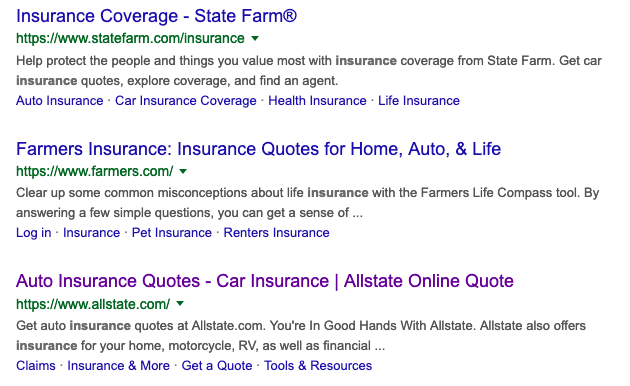
But, let’s say you sell life insurance. That’s a more specific term for your business and what you sell. We enter the keywords “life insurance” into a Google search and get these results:
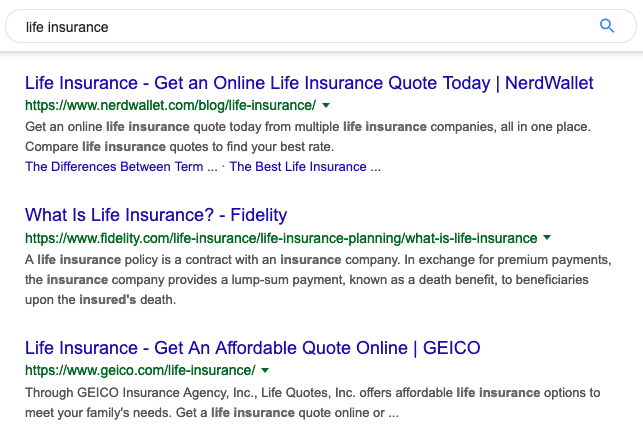
The results are different. That’s not a surprise as you have used Google before and seen similar results.
The question becomes, how do we know what keywords we should be using?
Keyword Research
Unfortunately, determining keywords is more than just sitting down and writing out a list of words. While it’s a good starting point, there always needs to be keyword research.
This will tell us how many searches are being done. It will also estimate how hard it is to compete for that keyword.
Moz, SEMrush, Ahrefs, and Google all have tools that allow you to do keyword research. They will give information such as how competitive a keyword is and how many searches are being done with it.
There are many other options for keyword research other than those I’ve already mentioned. For this example, I am going to use Ubersuggest, a free tool that Neil Patel offers. I’ll input “insurance” to see what information it gives us.
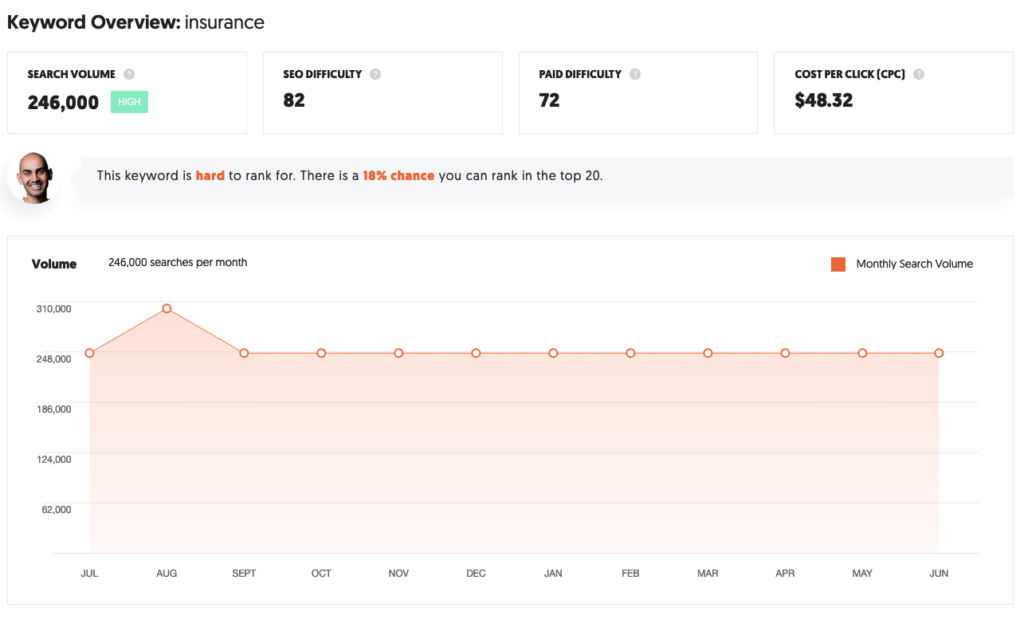
As you can see, there is a high search volume for this keyword, 246,000 a month. The SEO difficulty is measured on a scale of 1-100. For this
I wouldn’t recommend to a
Now, let’s do a search on “life insurance” and see if the results are more encouraging.
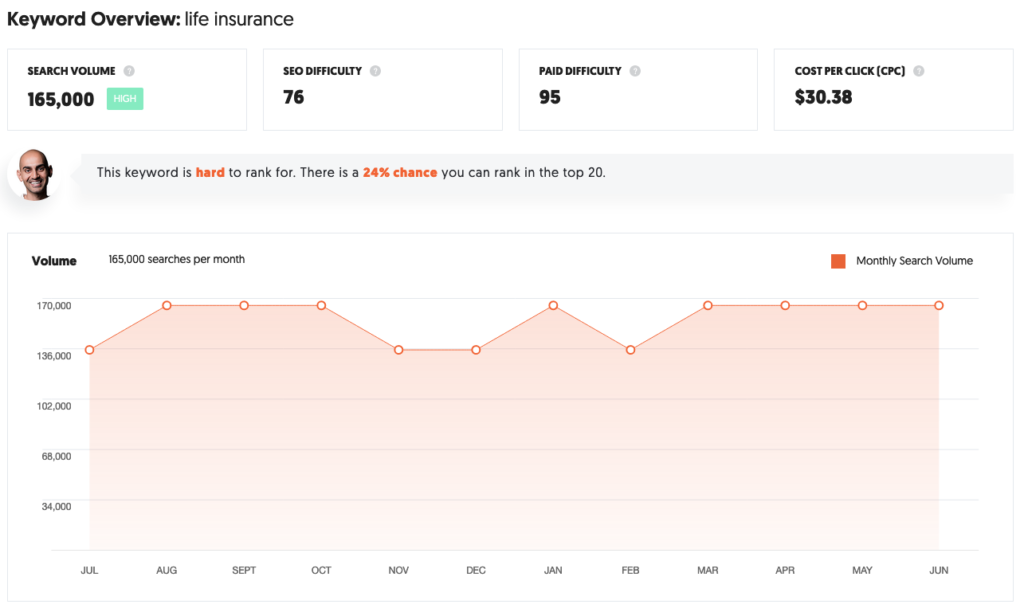
You’ll notice that the search volume is lower in this example, 165,000 searches a month. This isn’t a bad thing. Usually, the higher the search volume is the harder it is to rank. Don’t feel like there needs to be a huge search volume for it to be a good keyword.
In many cases, you’ll be better off using keywords that have a lower search volume. Fewer searches usually means less competition for that keyword.
It’s worth pointing out that if you’re using keywords that come up with a really small volume such as 5 or even 0, you might also want to find a different keyword that has higher volume. You don’t generally want keywords that won’t have the possibility of sending traffic to your website.
Our keyword, “life insurance”, gets a score of 76. It’s slightly easier to rank than our previous example but it would still be hard to rank in the top 20. Once again, I would say that it’s not worth it. We need to keep working to find a keyword or even phrase that might be easier to rank for.
Ubersuggest, like many other tools like it, also gives keyword suggestions. If you were in it, below the previous graphic, you would see this:
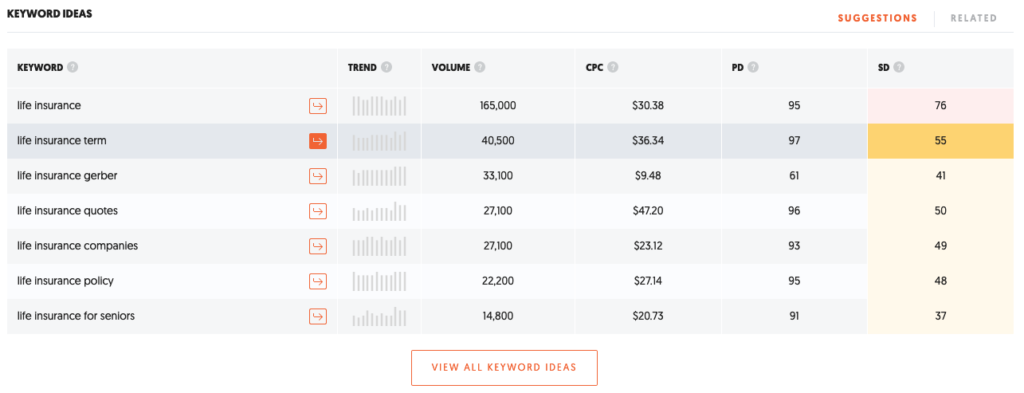
We want to focus on the volume column and the SD column, which the SEO score.
If we open the view all keyword ideas we get 355 suggestions.
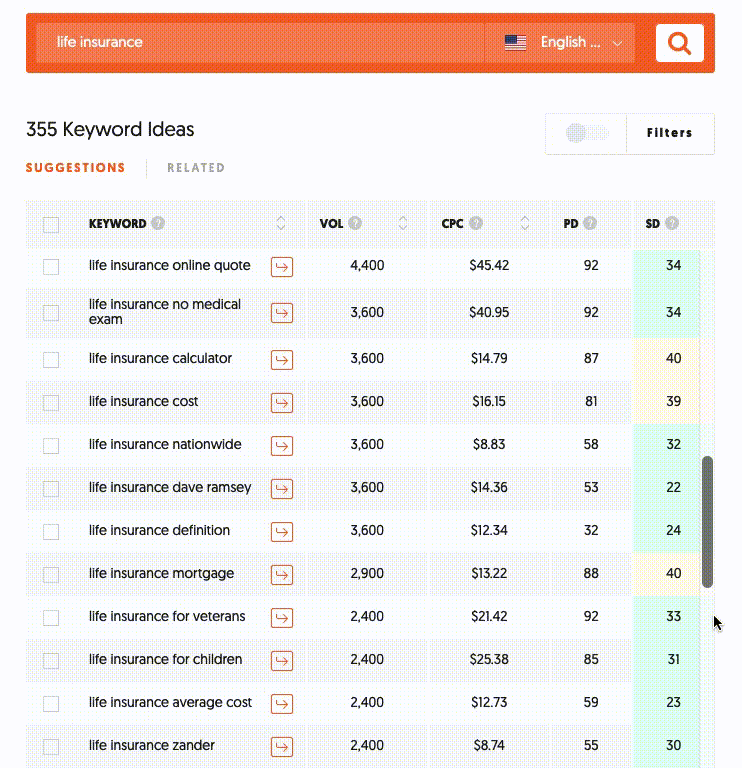
This is only a small portion of the list but you can see there are some keyword suggestions in which it will be easier to rank. Some of the keywords are also longer. They are what we would call long-tail keywords.
There are also other tools that will help uncover keywords. One is Google itself. When you have performed a search, you’ve no doubt seen the autosuggest come up as your typing. Those are terms that people are searching for and they could potentially be good keywords. Google also lists similar searches at the bottom of search engine results pages.
Another great tool to uncover possible keywords is Answer The Public. It combines the autosuggestion information from Google and Bing and turns it into a visualization.
So as you can see, there are plenty of tools to help us determine the best keywords to use for a website.
Final Thoughts
SEO can feel overwhelming. Don’t let it be. Start simple by finding the right keywords.
Do your research. While it will take some time it will be worth it in the end.
- Stop Planning and Start Strategizing - October 24, 2024
- The Importance of Creating a Connection With Your Marketing - June 6, 2024
- Reach vs Visibility: Which is Right for Your Marketing? - February 13, 2024

